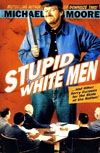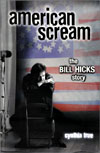
Comment
on this story
|
 |

New titles offer doses of Michael Moore and Bill Hicks
by Paul Lewis
What a time to be a liberal, eh? Heck, it's even a tough time to be a left-leaning conservative. Luckily for those so inclined to fidget over such a thing, one new book either inspires the sympathetic reader to change the system from within, while the other speaks to work over a decade old which still rings with an eerie sociopolitical prescience.
Michael Moore's new tome Stupid White Men (Regan, $24.95) shot up the best-seller charts based on the ranks of those disaffected by political games of all stripes and, well, a zippy title.  Moore is definitely a strong voice and a man inspired to take up causes. He's also drawn criticism for making his causes secondary to fostering a cult of personality and, in his film Roger & Me, making as much fun of those people put out by the closing of a GM plant in Flint, Michigan, as he did of the corporate weasels who leveraged the closure in the first place. In Stupid White Men, his laser sights are definitely on the heads and hearts of the Republican political machine and the Democratic Party that can be increasingly confused with the former. Moore is definitely a strong voice and a man inspired to take up causes. He's also drawn criticism for making his causes secondary to fostering a cult of personality and, in his film Roger & Me, making as much fun of those people put out by the closing of a GM plant in Flint, Michigan, as he did of the corporate weasels who leveraged the closure in the first place. In Stupid White Men, his laser sights are definitely on the heads and hearts of the Republican political machine and the Democratic Party that can be increasingly confused with the former.
Moore comes off as a liberal Rush Limbaugh in his presentation, just as concerned with his oft-comic production as he is with the issues he's trying to eviscerate. Probably best known for his documentary filmmaking and his satiric, sarcastic newsmagazine TV Nation, Moore's leitmotif is that he refuses to just get over what he terms the thievery of the presidency as leveraged by the state of Florida and the conservative Supreme Court. He counts the Bush transgressions since he assumed office and even offers up a copious appendix of sources for his finger-pointing.
Moore's approach is scattershot, however, because he rarely keeps a tone for more than a couple of pages before he has to try to be funny, bring up another political sin, or offer up his opinion in a "this is so commonsensical, why isn't anyone else saying it?" tone of voice. His call for those who are fed up with the system as it is to get involved at a local level to effect national change is the most heartfelt and honest section of the book, and it's sure to inspire at least one new Green Party city councilman somewhere in America.
Either a prophet or a vulgarian, depending upon your point of view, Bill Hicks was a raging force in stand-up comedy from the mid-'80s to the early '90s. One of the few comics I'd have no problem pinning the term "genius" on, Hicks struggled for acceptance in the States while he became a sensation in the U.K., playing theaters and auditoriums instead of comedy clubs. His legions of fans would likely devour any take he had on the current state of world affairs, which doesn't seem so different from his heyday when Hicks railed against bland corporate "rock" (is Debbie Gibson that different from Britney Spears?), unwavering conservatism that attempts to remove or refute freedoms, and pretty much anyone or anything that takes themselves too seriously. Just as the media was showing renewed interest in Hicks' work due to a set banned by The Late Show With David Letterman producers and CBS, and a BBC TV pilot called Counts of the Netherworld he was preparing, he succumbed to pancreatic cancer and died on February 26, 1994.
Bill Hicks' first biography, Cynthia True's American Scream (HarperEntertainment, $14.95), suffers from not being able to interview its subject, but gets just about everyone else—acquaintances, colleagues, managers, and girlfriends. While not encyclopedic, it is  nevertheless a welcome and vital overview of the genesis of Hicks' comedy and the friends, family, ideas, and ideals that most influenced him. The book gives non-fans just enough of a taste of his actual material to get them slavering for more. nevertheless a welcome and vital overview of the genesis of Hicks' comedy and the friends, family, ideas, and ideals that most influenced him. The book gives non-fans just enough of a taste of his actual material to get them slavering for more.
For old-time fans, some of the revelations about Hicks' life may come as a surprise. For years, he and his best high school friend and first comedy partner Dwight Slade avoided drugs, alcohol, and most amazingly, cigarettes, even developing a shorthand catchphrase, "WDPS?" or "Why Do People Smoke?" Quite a departure for a performer who challenged non-smokers with such diatribes as "I'd quit smoking if I didn't think I'd become one of you" and recommended smokers simply stay away from the Surgeon General warning labels that foretold of lung cancer. Hicks' subtext was always freedom of choice and expression, and his is a cynical, tortured voice that is missed and even needed in an environment when those freedoms are again threatened.
Regardless of whether you adhere to their views, Moore and Hicks remain vital, intriguing, and—perhaps most important to our sound-bite culture—entertaining voices who are capable of compelling and challenging audiences. If only we had the option of getting both men in the same room together.

August 15, 2002 * Vol. 12, No. 33
© 2002 Metro Pulse
|